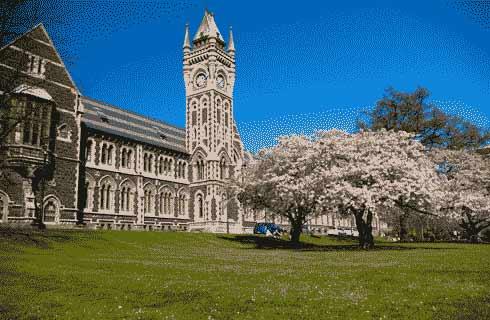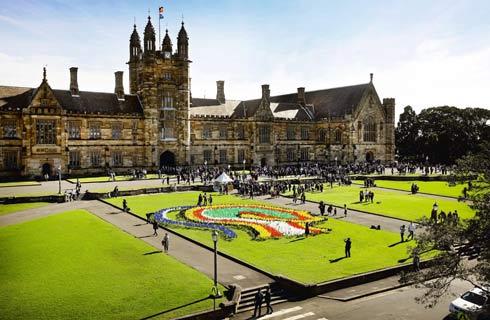人类学哲学博士。
Doctor of Philosophy in Anthropology

学历文凭
Ph.D.

专业院系
Department of Anthropology

开学时间

课程时长

课程学费

国际学生入学条件
The minimum requirements are a bachelor's degree (based on a four-year curriculum) completed before graduate study begins or its international equivalent with an accredited institution; an average grade of B (cumulative GPA 3.0) or better.
The required minimum total score on the exams are internet-based TOEFL exam = 90, The IELTS exam = 7.
IDP—雅思考试联合主办方

雅思考试总分
7.0
- 雅思总分:7
- 托福网考总分:90
- 托福笔试总分:160
- 其他语言考试:NA
CRICOS代码:
申请截止日期: 请与IDP联系 以获取详细信息。
课程简介
The department offers advanced work leading to the Master of Arts and Doctor of Philosophy degrees. Students admitted into the graduate program are admitted for the Ph.D. degree. A master's degree may be taken as part of the program leading to the Ph.D. degree, however, a master's degree is not an essential part of the doctoral program.<br><br>In order to organize constellations of research interest, the department curriculum is organized by Programs and Concentrations. Programs are offered in Archaeology, Human Biology, Ecology, and Evolution, and Sociocultural Anthropology and Ethnography. Concentrations include Health, Medicine, and Humanity, Global Engagement, Race, Difference, and Power, Heritage and Unwritten Histories, and Social Formations and Processes. Students are expected to take at least three courses from within their chosen area of concentration or from a set of courses designated by their program.<br><br>Programs are distinguished from Concentrations by their institutional links to other faculty and administrative units on campus, and by their greater specificity for certain course requirements. Students interested in one or the other Program are advised to so declare when they enter the department if they have not yet done so. Students interested in choosing a Concentration may make this choice after beginning their graduate work. The choice of Concentration or Program must be made by the end of the student's third semester. Whichever path the student chooses, the faculty expects all students to obtain broad training in anthropology. To this end, graduate students may take courses offered by other departments or institutions such as Duke University. Departmental policy is to help the student select courses that supplement and strengthen the specialization in anthropology.<br><br>Incoming graduate students are required to complete the appropriate two-semester core course sequence for their concentration: Sociocultural Theory and Ethnography (ANTH 701, 702) or Evolution and Ecology (ANTH 703, 704). In addition, incoming students will either choose to complete the remaining core course sequence, or take one course from that sequence and Archaeological Theory (ANTH 705). Other courses are selected from a list of concentration courses, field research courses, and professional preparation courses.<br><br>During the second year of study, graduate students are required to produce a substantial piece of independent research, advised by a three-member faculty committee and presented to the entire faculty at the end of the fourth semester. Graduate students are advised to take their written and oral Ph.D. exams by the end of the sixth semester.<br><br>The Ph.D. degree requires specialization in a defined area of study and the completion of an acceptable dissertation treating some problem within this area. The Ph.D. program is quite flexible, any area or problem can be selected for study, provided it meets the approval of the student's adviser, Ph.D. committee, and the faculty. Part of the training of a professional anthropologist is based on a minimum of one year's fieldwork, which provides the context for the dissertation data in sociocultural anthropology or human ecology. For students concentrating in archaeology or biological anthropology, the Research Labs in Archaeology offer opportunities for student-led investigations as well as analysis of existing collections of archaeological material.
相关申请
 预科
预科 奖学金
奖学金 实习机会
实习机会 在校学习
在校学习 跨境学习
跨境学习 校园授课-线上开始
校园授课-线上开始 在线/远程学习
在线/远程学习
开学时间&学费
学费信息仅供参考,请与IDP联系以获取详细信息
| 开学时间 | 时长 | 学费 | 地点 |
|---|
学校排名

世界排名56
数据源:
泰晤士高等教育世界大学排名
关于北卡罗来纳大学教堂山分校

北卡教堂山是全美第一所公立大学,从她成立到现在,已然过去了两个多世纪。作为美国最好的公立大学之一,UNC教堂山的校区占地729英亩,校园包括了一座艺术博物馆、一座天文馆、植物园、花园式教室等等。炙手可热的学术项目,世外桃源般的校园与南部卡罗莱纳湛蓝的天空相结合,为北卡教堂山赢得了“南方天堂”与“南方常青藤”等美誉。广泛的资源为北卡教堂山223个专业提供了坚实的学术后盾。这里最有影响力的专业是新闻与商科。UNC北卡竭力为学生提供尽可能多的课堂外研究机会,比如旨在培养企业家精神的Carolina Entrepreneurial Initiative,以及学生自己组织,每年为最好的商业企划提供五万美金奖励的Carolina Challenge。如果你厌倦了在教室之间奔波,可以选择到全美人文科学中心所在地Research Triangle Park,应聘做助理研究员。根据北卡罗来纳州的法律,UNC北卡必须保证至少82%的学生来自本州,这也导致了州外及国际学生申请录取的竞争非常激烈。不过,想一想“公立常青藤”的学术能力,雄伟壮观的校园,70个国家300个交流项目的机会,以及篮球之神乔丹母校的名望,为什么不申请呢?
本校相关课程

Doctor of Philosophy in Marketing
学历文凭
Ph.D.
开学日期
课程费用总额


Doctor of Philosophy in Finance
学历文凭
Ph.D.
开学日期
课程费用总额


Doctor of Philosophy in Accounting
学历文凭
Ph.D.
开学日期
课程费用总额


Master of Accounting
学历文凭
Masters Degree
开学日期
课程费用总额


Doctor of Pharmacy
学历文凭
Ph.D.
开学日期
课程费用总额


Juris Doctor and Master of Arts in Mass Communication
学历文凭
Combined Graduate / Doctoral Degree
开学日期
课程费用总额










 美国
美国